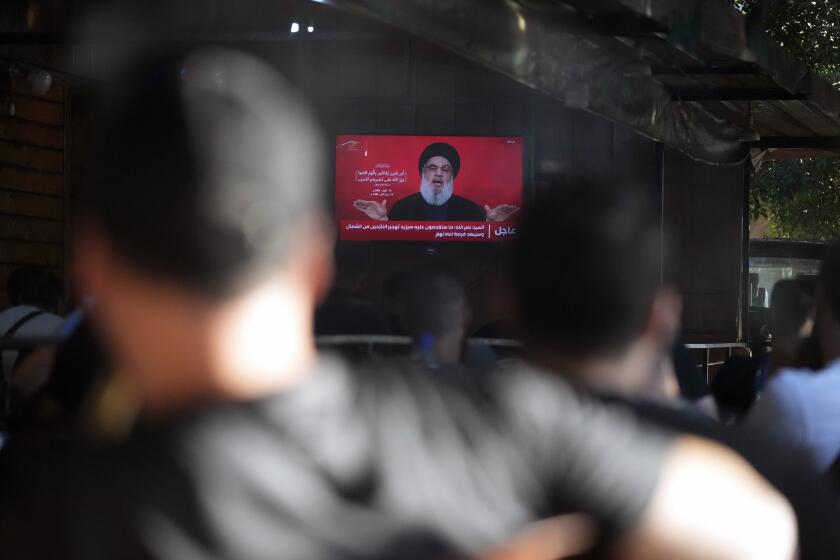Pro-Kremlin parties ahead in Russian regional polling
Russian voters went to the polls Sunday in regional elections dominated by two pro-Kremlin parties, a result that critics said gave the appearance of democracy without its substance.
Sporadic incidents of violence were reported, and in the Moscow region, protesters who called the elections fraudulent were arrested.
United Russia, the main party backing highly popular President Vladimir V. Putin, appeared set to win the most votes. But a new party called Just Russia, led by Sergei Mironov, a Putin ally who heads the upper house of parliament, also did well, according to early returns.
With 70% of the vote counted in St. Petersburg, the country’s second-largest city, United Russia had 37% support, Just Russia 22%, the Communist Party 16% and the ultranationalist Liberal Democratic Party 11%. Partial results from other regions also typically showed the four parties finishing in that order.
The Union of Right Forces, a party advocating Western-style democracy, had 5% in St. Petersburg, short of the 7% minimum needed to win seats in the city’s legislature. Another prominent liberal party, Yabloko, had been kept off the ballot in that city.
Strong showings by the two big pro-Kremlin parties would make them the main contenders in parliamentary elections slated for December. The two parties could then either field their own candidates in the 2008 presidential election or throw their support behind one person, making that contender virtually unbeatable.
The final results may also make clear whether Russia’s beleaguered pro-Western liberal opposition parties can hang on to some influence in national politics. The voting was for legislatures in 14 of Russia’s 86 regions. About 31 million people, or one-third of the country’s electorate, were eligible to participate. Although the Moscow region voted, the capital did not.
Skeptics say the two pro-Kremlin parties are virtually indistinguishable, composed primarily of politicians and bureaucrats who unreservedly support whatever decisions come out of Putin’s closest circle. Just Russia’s campaign promises placed greater emphasis on tackling poverty and solving social problems, an approach seen by analysts as an attempt to draw votes away from the Communist Party.
“The main goal of this process is to create for the West a semblance of free and democratic electoral struggle in Russia,” said Leonid Radzikhovsky, an independent political analyst. “Ninety-nine percent of what is happening with the election now is the imitation of real political life.
“On the other hand, I wouldn’t rule out that eventually this false two-party system may grow into something closer to real political competition.”
Incidents involving activists from the National Bolshevik Party, a small, radical anti-Kremlin group that often stages flamboyant protests, were reported in the Moscow region, which includes the area around Moscow but not the city itself, and in the Samara region, about 550 miles southeast of the capital.
The protesters in the Moscow region threw a smoke grenade into a polling station, shouting, “This election is a farce!” and “We do not want elections without choice!” as police dragged them away, the Reuters news agency reported.
In Buynaksk, Dagestan, a man was wounded in a shooting incident near a polling station, the Interfax news agency reported. In St. Petersburg, Viktor Bykov, an activist for Just Russia, was stabbed early Saturday morning, the Russian news agency RIA Novosti reported. Mironov, the party leader, condemned the attack as “a politically motivated crime.”
Yabloko, which in the 1990s was an influential party supporting human rights and Western-style democracy, was banned from the ballot in St. Petersburg. Election officials ruled that petitions Yabloko submitted to qualify for the ballot failed to meet requirements because more than 10% of the signatures they checked were invalid.
“Yabloko is a real opposition to the authorities. That is why they try to prevent us from taking part in the elections,” said Sergei Mitrokhin, the party’s deputy chairman. “We were kicked out of the campaign in the most cynical way.”
St. Petersburg is Yabloko’s biggest stronghold, and analysts had predicted that it might have won up to 20% of the vote had it been allowed on the ballot.
The Kremlin “is building a false model of democracy” by creating tame political parties that it controls, Mitrokhin charged.
In some of the regional contests, however, candidates for the two pro-Kremlin parties have not hesitated to heap criticism on each other.
The battle was particularly fierce in Samara, where Gov. Konstantin Titov led United Russia and Samara Mayor Viktor Tarkhov led Just Russia.
Just Russia put up billboards with slogans such as “The party of justice against a gang of embezzlers of public funds” and “Bureaucrats stop stealing!” United Russia was less aggressive in this region, focusing on promises to boost pensions and salaries.
Yabloko’s Mitrokhin said such signs did not mean that there was real competition in national politics. “Bureaucrats are allowed on the local level to challenge one another from time to time, but no one challenges the Kremlin,” he said.
*
Times staff writer Sergei L. Loiko contributed to this report.
More to Read
Sign up for Essential California
The most important California stories and recommendations in your inbox every morning.
You may occasionally receive promotional content from the Los Angeles Times.










